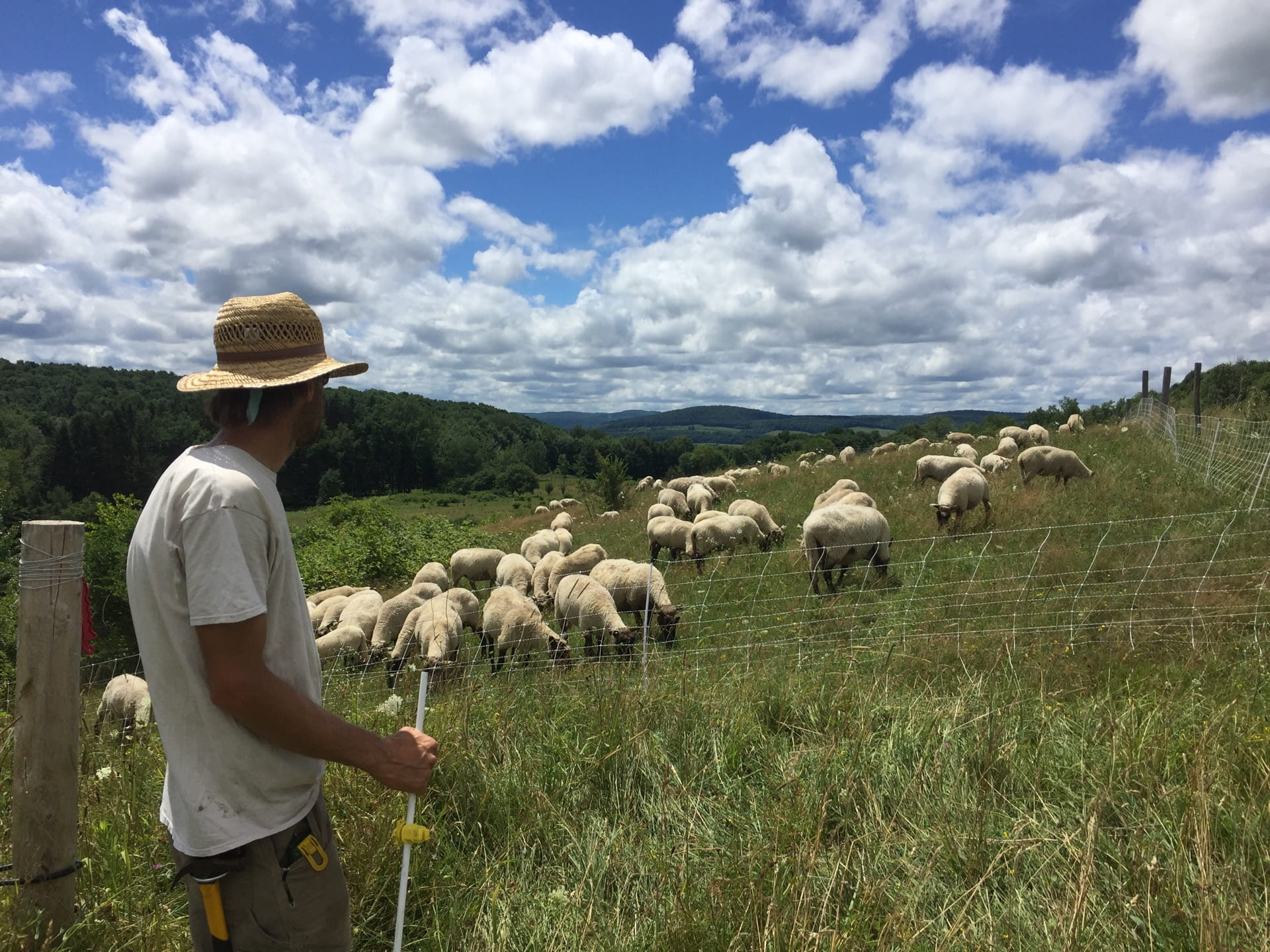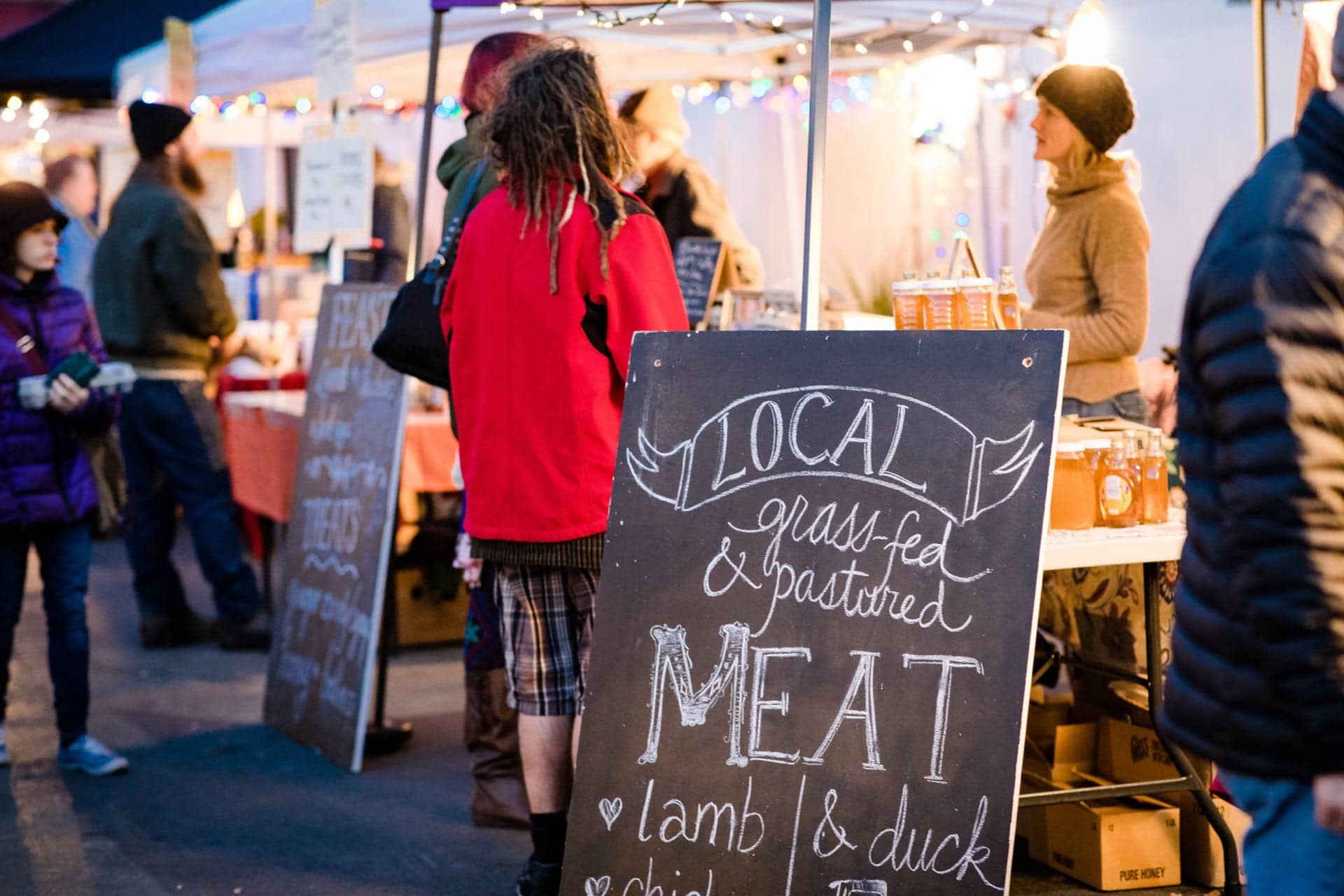Selling Real Farm Products in a Virtual Marketplace
There are myriad options to explore, from a personal online store to a collective online farmers’ market.
Four years ago, I was using a common mix of marketing channels for my small diversified farm: a farmers’ market and restaurant accounts, along with direct sales of whole and half animals. I knew I was missing an opportunity to sell to the neighbors in my rural community who wanted to buy from me, but didn’t often make it to the farmer’s market where I was selling.
That winter, I met George Duggan at a grazing conference. George is the force behind Eat From Farms, a farmer-friendly online store platform. He convinced me to give it a try, and it has proved a fantastic addition to my marketing toolbelt. It did require hours of work to set up — photographing my products, writing a description for each one, entering all the quantities and pricing information — but I did all that during the winter “down time,” and my online store now requires very little maintenance.
Combined with my self-serve on-farm store, it has completely replaced my farmers’ market sales. Of course, Eat From Farms is not the only online sales option. There are myriad options to explore, from a personal online store to a collective online farmers’ market.

Adam Perrin of Quarry Brook Farms, an Eat From Farms customer, counts his sheep. Courtesy of Kelly Christensen Perrin / Quarry Brook Farms.
No Substitute for Marketing
Online sales are not a marketing strategy, but rather a sales channel. Selling online does not absolve you of any of the standard marketing advice. You still need to brand your product, clearly articulate why anyone should buy from you, choose appropriate pricing, know your target customer and figure out how they will find out about your farm.
Online Sales: Myths and Tips
Over the past decade many options have emerged that allow farmers to sell their products online. You do nothave to be willing to ship your products in order to make online sales, though if you are willing to ship to far-away buyers this certainly opens up new venues. It also means more expense — in packaging, shipping fees, and time — so make careful estimates of these costs before choosing to go this route.
New players are constantly entering the online sales marketplace for farmers, often with major venture capital backing and claims of disrupting the conventional retail model. Take all claims of wild confidence with a grain of salt! One company thought it would be the end of grocery stores, but ended its farmer sales and delivery platform after just a couple years.
Before investing your valuable time in the use of any platform for your product sales, consider these six points:
- The longevity of the platform: How long have they provided an outlet for farm product sales? How has the platform evolved over time, and where is it heading? What features are scheduled to be added, and when?
- Farmer clients: How many farms use this platform, and what are they selling? If possible, talk to the other farmers using that online sales platform. Are they happy with it? What do they like and not like about it?
- Fees:What does it cost to sell on this platform? Is it a flat fee, or a percentage of sales? Does this include the credit card processing fee? Does the platform allow your customers to use payment methods besides credit cards?
- Ease of management: How easy is it to manage your inventory and pricing? What will be required of you once a customer makes a purchase? How easy is it to print out pack lists and other reports?
- Order Fulfillment: How will this online sales option fit with the rest of your marketing? Will you need to deliver or ship products? Can you integrate order fulfillment with your other markets (for example, dropping off orders on your way to a farmers’ market, or servicing a buying club pick-up site when you are on your way to pick up feed)? It’s never a good idea to rely solely on any single marketing channel, so think carefully about how this will fit with your other channels.
- Customer Experience: Peruse the online store of another farm on this platform to see what it’s like to be a customer. Is it user-friendly from a customer’s perspective?
Platforms for Selling Online
There are so many models that it is difficult to classify the options available. Loosely, I will categorize them as “Online Marketplaces” and “Personal Farm Stores.” This is not a comprehensive list, nor am I recommending any one service over others. There is no one-size-fits-all solution with online marketing.
Online marketplaces are like big farmers’ markets on the internet. You can pay for a “booth space” or a listing, and your products will be presented to potential buyers alongside many other producers’ products. At farmersmarketonline.com, you can only sell one category of product per booth (i.e. melons, but not corn and tomatoes too). This site seems oriented toward farms willing to ship their products, though it could be used to service local orders for pick-up too. I explored this site as a potential customer and found it somewhat hard to use. When I searched for rabbit, I was directed to a listing for rabbit produced in China and sold via Amazon!
A small farmer runs locallygrown.net, which is designed for a farmer or market manager to start their own multi-producer online market. This platform simulates a live farmer’s market, with the ability to be open only during a certain time frame, display goods, collect money, and communicate with customers. Major benefits include the time saved not having to sit at a market, and not having to harvest or pack up products until they are sold.
We have a few NY-based versions of this “online farmers’ market” idea already, though they each run on a different software platform. Schoharie Fresh is administered by SUNY Cobleskill and has been operating since 2011. Customers have a weekly order deadline, and farmers have about 48 hours from the deadline to deliver orders to the pick-up spot on the SUNY Cobleskill campus.
Farmer Shannon Mason from Cowbella Creamery has sold value-added dairy products via Schoharie Fresh for years, though the dairy is not currently selling on the platform since they are reconfiguring their product line. “We used Schoharie Fresh almost from the beginning and found it to be an easy sales channel to add to our mix,” Sharon said. SUNY Cobleskill adds a 15% fee to the farmers’ price, and farmers get paid within a week or two for the products they’ve delivered. The software allows farmers to control inventory and limit orders on items only available in small quantities.
Source Otsego is a newer version of this idea and is hoping to launch in early summer. Jim Barber, who works for Cornell Cooperative Extension in Otsego County, is trying to build interest among farmers and customers to promote the service. “One challenge is finding a centralized drop site, like a workplace with a few hundred employees, with someone there who is willing to help with logistics on delivery day,” Jim said.
A third example of this online farmers’ market concept in NY is wildkale.com. This site is similar to the others mentioned above, featuring a diversity of products and farms, except these farms are scattered further afield (up to 4 hours from your zip code, in NY, NJ, and PA) and the farmers ship orders to their customers.

Shelterbelt Farm now does only occasional holiday markets, like this Thanksgiving market in Ithaca, NY, due to her success with both online and on-farm stores. Courtesy of Allison Usavage.
Personal Farm Stores
You can use any existing shopping cart software to build an online store connected to your farm website. Companies offering this service include Wix, Shopify, and Square. Their fee structures are all different, but what they have in common is that none of them were designed specifically for farms. Steve Gabriel of Wellspring Forest Farm uses Wix for their online store. “It works well enough for shelf-stable products but can be problematic with event registrations as the default is to charge a shipping fee,” Steve said. “Also, it’s not set up to handle variable-weight products like meat, where not all leg roasts weigh the same.”
Several online store platforms exist that were designed specifically for farmers. GrazeCart is based on the highly successful direct marketing efforts of Seven Sons Farm in Indiana. After field-testing their system for years on their own farm, these enterprising farmers have made the service available to anyone. They charge a monthly fee and don’t take any additional percentage of your sales. The monthly fees range from $768 to $2388 per year depending on the scale of services you require, so your sales via the site would have to be significant to support the cost. The features they offer may be sophisticated enough to justify your expenses, including ability to integrate their service with MailChimp for customer communication and QuickBooks for book-keeping. And if you don’t already have a website, GrazeCart can fill that function too.
Barn2Door is another platform for online ordering, and is designed to be your website too. It is visually beautiful and mobile-responsive, including one-touch ordering and the ability to designate different delivery sites. The price varies from $468 to $1,188 per year, making it an affordable option if you don’t already have a website.
Eat From Farms offers all the flexibility of these other options at the lowest price point, $108/year. This platform also allows for collaborative marketing, so you can add other farmers’ products to round out your offerings, and the other farmers can control their inventory and pricing.
A new feature that I really enjoyed last year, when I offered my first Orchard Membership U-Pick, is that Eat From Farms now allows customers to pre-load their account with a balance that they draw down throughout the season. It may not have the visual frills of some of the other sites, but is probably the best value. Owner George Duggan provides an unusual and personal level of support whenever needed.
Would you get more customers with the convenience of online ordering? Could you grow your business?
What are your goals for online sales?
How does this fit with your existing marketing channels?
Only you can answer these questions, but with the rise of consumer expectations around convenience, adding an online sales channel is probably a good bet. The platforms mentioned here represent a starting point for a research foray into your options.
We hope they help you grow a profitable, thriving farm business!


awesome content very informative!
Thank you for this critical information.
We all need Farm around more than anything. Specially that processed food is really bad for anyone health.
This is the reason I am more involved in herbal natural supplements.
http://www.4life.com/collado/shop
Thank you for providing this useful information.
THANK YOU SO MUCH, please help me promote my website. shout me out
agrovalleyltd.com
Great information. We could use this in the Southern Tier and as a platform to educate about healthy foods.
awesome content very informative